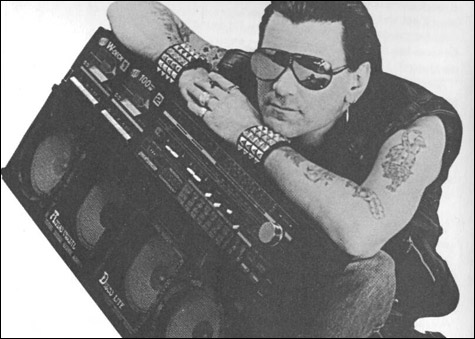 Album: Standing in the Spotlight, Dee Dee King (a/k/a Dee Dee Ramone)
In the late ’80s, bassist Dee Dee Ramone (née Douglas Colvin) quit his eponymous band and made the absurd decision to record a rap album, under the nom de mic Dee Dee King. It’s since been disparaged as one of the worst albums ever made, and, yes, seen as a hip-hop record, it’s easy to see why. Dee Dee’s rhymes and “rap” vocal phrasing are clueless, and the incoherent execution of the record — in every minute detail, from its pink album cover and photos of Dee Dee, in all his scumbag CBGB glory, mugging with a Run-DMC–style black fedora and Mercedes dookie chains, to ludicrous boasts like “I’m the baddest rapper in Whitestone, Queens” — seems like a lackadaisical gag. (It wasn’t.) But seen as the great lost Ramones album, Spotlight is more than a rapper’s delight: it’s a happy accident that captures the raw, naive talents of an outsider artist. On display in Spotlight is the formula that fueled the Forest Hills Fab Four’s Rocket to Russia and other early-career successes (successes arguably responsible for every good album made by any rock artist after 1976): cartoonish bravado and fantasy narratives (meeting a mermaid in “Commotion in the Ocean,” becoming the world’s best wrestler in “The Crusher,” being a fucking rapper in multiple tracks); raw id (“I Want What I Want When I Want It”); Spector-esque girl-group vocals (here provided by Debbie Harry on “Mashed Potato Time”); political naiveté bordering on idiocy and a Teuton-centric world view (“German Kid,” which features rapping in Deutsch, and the admittedly cringe-worthy English couplet, “I used to live in Berlin/It’s pretty cool to be half German”). Dee Dee was delusional, clumsy, and lost, but he was also a goofy genius who, even at his drug-and-drink-addled worst, could pen deceptively simple, hook-riddled nuggets. — Lance Gould |